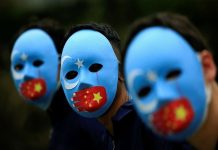The Hamas group shocked the world in October this year as it unleashed a completely new modus operandi of death, destruction and havoc. While the concept of violent non-state actors gained widespread traction in international relations post 9/11, the breach of Israeli sovereignty, in which gunmen went from home to home butchering Israeli civilians, parading dead bodies, mocking and spitting on hostages, while uploading videos for the world to see, is new.
Several countries, irrespective of the divides between the Global North and South, condemned the terrorist acts and voiced support for Israel. China, which claims to be a responsible player and vies for the leadership of the international system, not only did not condemn the terrorist act, but also rubbed salt on wounds by outlining the two-state solution and the need for the creation of Palestine.
While several countries of the world do support a free Palestine, conflating Hamas with Palestine is factually incorrect. Hamas is a Sunni Islamist political and military organization that is the de-facto government in the Gaza Strip. The US, the European Union, Australia, Japan and some other countries have designated Hamas as a terrorist organization owing to its armed resistance against Israel, which has included suicide bombings and rocket attacks. Its rival party, Fatah, which dominates the Palestine Liberation Organization (PLO) and rules in the West Bank, has renounced violence.
Since 2007, there have been two separate administrations in Palestine – one in the West Bank and the other in Gaza Strip. The government in West Bank is recognized as the Palestinian Authority government. Mahmoud Abbas is the president of the state of Palestine and has been chairman of the PLO since 2004. On October 13, when US Secretary of State Antony Blinken met with President Mahmoud Abbas in Amman, Abbas reaffirmed his belief that the PLO is the legitimate group representing all Palestinians, and not Hamas.
Beijing’s initial statement on the terrorist attacks by Hamas, released on October 8, failed to condemn Hamas, which even prompted US Senate Majority Leader, Chuck Schumer (who was leading a congressional delegation in China) to hector Xi Jinping for soft pedalling Hamas’ atrocities. In a statement later, the Chinese Foreign Ministry condemned harm to civilians, but yet again refrained from calling out Hamas by name. In the regular press conference of the foreign ministry spokesperson on October 9, Mao Ning cleverly navigated questions about Hamas’ atrocities. She also avoided referring to Hamas by name.
An example of this was in Mao’s response to the question from O’Globo on whether China considers the attacks in Israel as terrorist attacks. Mao said China was “deeply concerned” about the “escalation of tensions and violence and saddened by civilian casualties…and the priority was to end hostilities and to restore peace as soon as possible and work together to de-escalate the situation”. There are numerous other such examples from the regular press conference, in which China clearly sides with Hamas terrorists. Mao also repeatedly used “Palestine” in her responses to questions regarding Hamas, betraying the wrong equation in Chinese foreign policy.
On October 13, Chinese Foreign Minister Wang Yi even blamed the rapidly deteriorating conflict in Israel on a lack of justice for Palestinian people. In a phone call with Brazil’s President Luiz Inacio Lula da Silva, Wang stated, “The crux of the issue lies in the fact that justice has not been done to the Palestinian people”. Just like Mao Ning, Wang also, in his talks, clearly equated Hamas with Palestine. On October 15, Wang Yi also stated that Israel is “acting beyond the scope of self-defence”. Clearly, yet again, China equates a non-state actor like Hamas as a state actor and expects rules of proportionality to operate with a non-state actor, which is simply impossible. In theory as well as practice.
China’s sheltering of terrorists from international anger is not new. Repeatedly, China shields Pakistan-based terrorists from being listed on the United Nations’ 1267 committee. The 1267 Committee, a list of terrorists, is one of the most important active UN subsidiary bodies to combat terrorism, especially in relation to the al Qaeda and the Islamic State Group. Interestingly, several IS flags have been found in the aftermaths of the attacks by Hamas in Israel. Last year, China blocked at least three attempts by India to list Pakistan based terrorists at the 1267 committee. Clearly, China does not show any inclination to address the global scourge of international terrorism – be it in condemning Hamas or blacklisting Pakistan-based terrorists at the level of the UN. This is despite the fact that China is a permanent member of the United Nations Security Council.
China also often talks about “true multilateralism” as the need for the 21st century and criticizes the current multilateral system. However, given its stand on global issues such as combating violent non-state actors, it is clear that while China wants strict counter-terrorism measures at home, including concentration camps for minorities, its standards are different when it comes to others. While pushing its own agenda of leadership of the international system, China thinks nothing of terrorists having a free rein in in other countries.

































